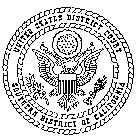

TO: Daniel J. Meador, Executive Director
FM: Chief Judge Marilyn L. Huff
RE: Commission Hearing in San Francisco
DATE: May 29, 1998
The purpose of my testimony is to express my belief, as a district court judge, that the Ninth Circuit Court of Appeals should not be split or restructured. The Ninth Circuit continues to efficiently administer its caseload and contributes significantly to establishing a uniform, national body of law. Further, no viable alternatives currently exist and splitting the circuit would require substantial expenditures to duplicate the current administrative structure.
Despite having a large amount of vacancies, the Ninth Circuit renders high quality and reflective decisions in a timely fashion, consistent with due process considerations. This is due in large part to the dedication of the Ninth Circuit judges. Studies indicate that the Ninth Circuit is the third fastest circuit in rendering decisions after argument and is the fastest circuit in rendering decisions in cases not requiring oral argument.
The Ninth Circuit also has developed innovative procedures to assist the judges in rendering timely decisions. For example, screening procedures are used to identify cases which may be resolved in a more expeditious manner. The Ninth Circuit also has been active in creating and promoting alternative dispute resolution procedures.
Thus, the Ninth Circuit's caseload does not justify a split of the circuit. A restructuring of the circuit certainly is not warranted based on the dissatisfaction of certain private interests with the results of particular decisions. Indeed, allowing such interests to influence the result of decisions would be contrary to our system of government.
Neither does the size of the Circuit warrant a split. Instead, the size of the
Circuit is one of its many strengths. By deciding almost one-sixth of all federal
appeals, the Ninth Circuit provides the nation with a uniform body of federal law.
The size allows a wide and diverse range of views and backgrounds to participate in
developing a national body of law. Splitting the Circuit may lead to separate, isolated compartments of law, according to region.
Beyond a lack of need to restructure one of the finest and highly respected courts, restructuring the circuit would result in unnecessary and significant costs to taxpayers. The Ninth Circuit already has in place the infrastructure needed to support the court. A split would require the duplication of this infrastructure, including the acquisition of additional buildings and staff.
In sum, the Ninth Circuit is able to perform its functions in a fair and efficient manner. Lacking any justification for a restructuring of the circuit, the expenditure of significant public monies is not warranted. I, therefore, respectfully suggest the Commission recommend against restructuring the circuit.